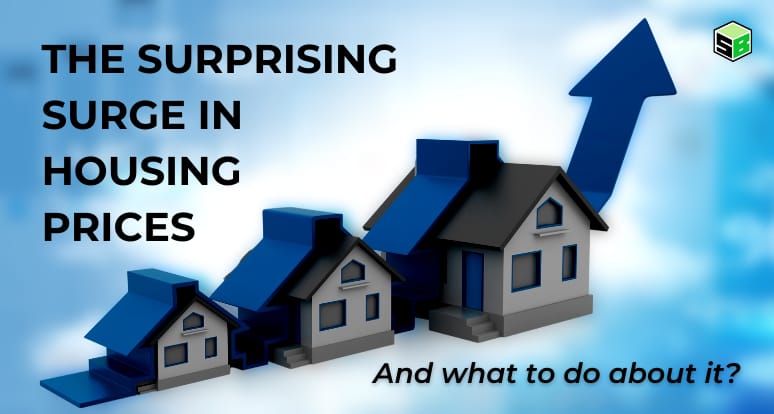And what to do about it

Housing prices are up and here’s why:
- The number of houses built in the 2010s was about half of what it was in the early 2000s, leaving less houses on the market today.
- Baby boomers are not moving out of their homes until relatively late in life, so there is less turnover of homes, which forces buyers into bidding wars.
- Low interest rates made it cheaper for buyers to borrow money while this year, high mortgage rates now mean larger monthly payments.
- Millennials, who are aging into their peak home-buying years, are buying more homes—and regretting it.
- Dollars and other currency are worth less due to historically high inflation.
This chart shows the number of houses built over the last 40 years, according to HUD, the US Department of Housing and Urban Development. Note the dip in houses being built in the early 2000s.
A recent report by the National Association of Realtors documents just how bad it is. “Two in three renters cannot afford to buy a home; one in two renters pay more than 30 percent of their income for rent due to rising rental costs,” says the report. “And it’s getting worse.”
The report calls out “two troubles” that are happening simultaneously: record-high home prices and record low inventory.
Back in January of this year, we reported that Zillow, a leading real estate marketplace, predicted that over the next 12 months, US home prices would rise 11% overall during 2022, a drop from the 17.5% increase in prices that peaked in October 2021.
“The housing market may not reach the incredible heights of 2021, but we expect it will be anything but slow next year. Expect the strong seller’s market to persist, the Sun Belt to maintain its top spot as the most in-demand region, and flexible work options to continue to shape housing decisions in new ways in 2022,” wrote the Zillow research team in their report.
Now, however, Zillow has revised its predictions. According to their new statistics,
- Home values will grow 16.4% between December 2021 and December 2022; and
- Existing home sales in 2022 are expected to total 6.57 million, up 7% from an anticipated 6.14 million sales in 2021.
The pandemic has added a twist to the problem of demand as many work-from-home employees realize that they can invest in property that is geographically distant from their place of employment and purchases larger homes with dedicated offices.
“With the [then] low mortgage rate environment and the freedom to flee high cost-of-living areas, renters who are working from home have more opportunities than ever to become homeowners,” reported Cherry Creek Mortgage recently.
For millennials who feel pressured into making quick decisions about purchasing homes, more than 80% have expressed regrets about their recent purchases, according to a new study by the Real Estate Witch.
“We’re stuck between a rock and a hard place,” Rondie Robinson, a potential home buyer, told CNBC in a televised interview. Robinson said he recently got a new job and is looking to upgrade to a larger home.
“We thought that because of the winter months that it would slack off a little bit, prices would start to come back down to normal, but that’s not happening,” he said. “It’s anguish, it’s pain, it’s agony.”
Tokenized Real Estate: A Forward-thinking Investment Option
Real estate has long been touted as one of the most stable investments you can make. It offers cash flow for rentals, tax breaks, equity building, and a hedge against inflation.
But what do you do if you want to own real estate and the option of buying a house is too expensive to achieve?
In a year when Moore Global predicted “the tokenized real estate market could hit $1.4 trillion within 5 years,” SolidBlock is optimistic that as digital assets power the logistics of the digital economy, the move from a centralized to a decentralized financial system will continue apace.
In August 2021, CrowdStreet reported that while tokenized real estate assets—essentially digital shares of properties launched and tracked on blockchain networks—have been around for a few years, “tokenization as a method of raising capital and providing investment liquidity hasn’t yet hit the mainstream of the commercial real estate industry.”
This means that SolidBlock is situated at the right place and the right time to offer, educate and entice investors with our carefully chosen, fully vetted property funds.
Instead of locking your money into a 30-year mortgage at inflationary levels, invest your money in tokenized real estate with the knowledge that you can trade—and liquidate—your holdings on your time schedule.
SolidBlock is an end-to-end platform that allows real estate developers and fund managers to raise capital as a benefit of tokenization. The inherent accessibility to these tokenized assets by small investors is the perfect vehicle to democratize investing and an invitation to a wider investor pool. Leveraging blockchain technology for peer-to-peer transactions that bypass traditional banking structures for secure, quick, and paperless trading, maybe just the ticket in this new world to raise funds transparently and wisely.
Visit our digital marketplace to view the projects we’ve tokenized.

 by
by 

